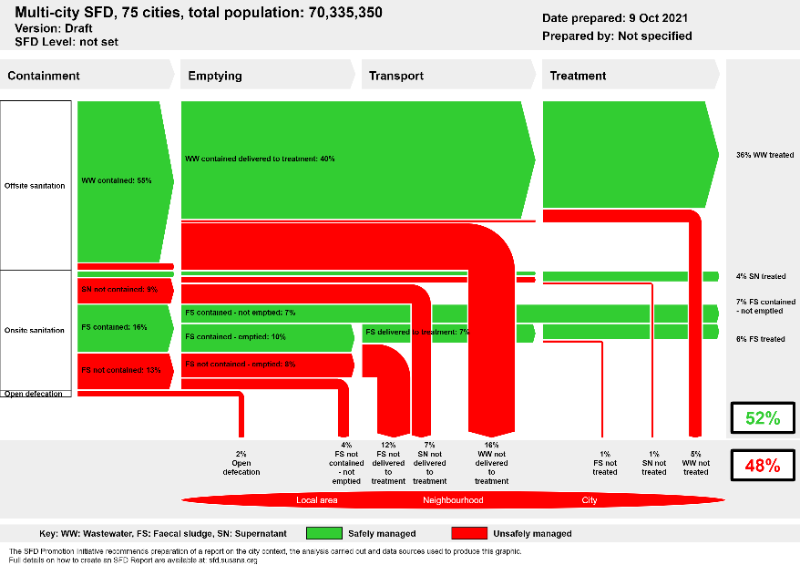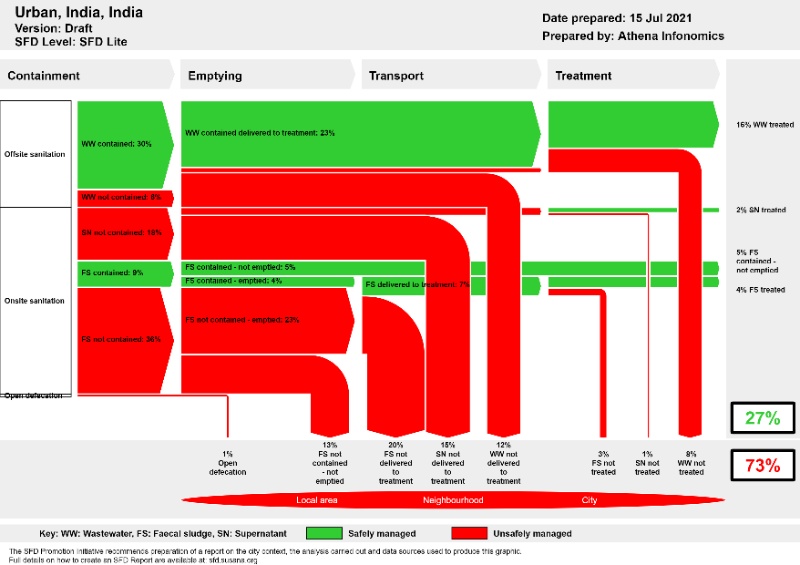- Markets, finance and governance
- Cities (planning, implementation, and management processes)
- Shit flow diagrams (SFDs) / Excreta flow diagrams
- How Clean is Urban India? (using a National SFD)
How Clean is Urban India? (using a National SFD)
7741 views
- Bhitush
-
 Topic Author
Topic Author- Passionate to work for Water and Sanitation for all l Non Sewered Sanitation l City Sanitation Planning l Shit Flow Diagram l Decentralised Wastewater Treatment Systems l Faecal Sludge and Septage Management l Formerly worked at Athena Infonomics and Centre for Science and Environment
Less- Posts: 6
- Likes received: 5
Thanks Paresh for your query and sorry for the late response. The SFD generated by the platform is just an aggregate of all the SFDs (which may not be a true representation of the whole of Urban India) uploaded so far on SuSanA platform, but the Urban India SFD we worked on looked at all the stages of the sanitation chain for the whole country for example for treatment we analysed FSTP data from NFSSM alliance and STP data from latest report of CPCB, similarly we had taken informed assumptions wherever documented data for the whole urban population was not available. The aggregate multi city SFD was also considered as a relevant input in this process.
Hope this answers your question.
Hope this answers your question.
The following user(s) like this post: paresh
Please Log in to join the conversation.
You need to login to reply- paresh
-

- Moderator
- Budding WASH researcher, especially interested in governance, public policy, finance, politics and social justice. Architect, Urban & Regional planner by training, Ex. C-WAS, India.I am a patient person :)
Less- Posts: 383
- Karma: 7
- Likes received: 143
Thank you Bhitush for sharing this.
I think there is a broad agreement that SBM focused on access alone and going forward we urgently need to focus FSM if we are serious about SDG 6 targets.
I tried to compare the graphic you shared with the one that can be prepared from sfd.susana.org/about/sfd-data (see below) to find a significant difference in the share of unmanaged wastewater. I assume your SFD is more refined as the sources of information are discussed in the blog. It would be great if you could tell us more about the changes in inputs that you made to arrive at this SFD.
Regards
paresh
I think there is a broad agreement that SBM focused on access alone and going forward we urgently need to focus FSM if we are serious about SDG 6 targets.
I tried to compare the graphic you shared with the one that can be prepared from sfd.susana.org/about/sfd-data (see below) to find a significant difference in the share of unmanaged wastewater. I assume your SFD is more refined as the sources of information are discussed in the blog. It would be great if you could tell us more about the changes in inputs that you made to arrive at this SFD.
Regards
paresh
Paresh Chhajed-Picha
Moderator, SuSanA forum
Project Manager at ADCPS
Indian Institute of Technology - Bombay, India
Moderator, SuSanA forum
Project Manager at ADCPS
Indian Institute of Technology - Bombay, India
Attachments:
-
 India_SFDgraphic.png
(Filesize: 94KB)
India_SFDgraphic.png
(Filesize: 94KB)
Please Log in to join the conversation.
You need to login to reply- Bhitush
-
 Topic Author
Topic Author- Passionate to work for Water and Sanitation for all l Non Sewered Sanitation l City Sanitation Planning l Shit Flow Diagram l Decentralised Wastewater Treatment Systems l Faecal Sludge and Septage Management l Formerly worked at Athena Infonomics and Centre for Science and Environment
Less- Posts: 6
- Likes received: 5
A rapid assessment of sanitation in Urban India using a National SFD brings out the reality of actual situation on ground and also maps the gaps in various stages of the sanitation chain. Given that the next phase of Swachh Bharat Mission is around the corner, it would be worthwhile to extract learning from the Shit Flow Diagram of Urban India, so that interventions can be supported in the areas where still a lot of work needs to be done to achieve safe sanitation for all. To read more about the SFD and the blog on the topic visit: watersciencepolicy.com/article/how-swach...dd9?language=English .
The blog is available in various Languages including English, Hindi, Spanish, Portuguese and French.
Attachments:
Please Log in to join the conversation.
You need to login to reply
Share this thread:
- Markets, finance and governance
- Cities (planning, implementation, and management processes)
- Shit flow diagrams (SFDs) / Excreta flow diagrams
- How Clean is Urban India? (using a National SFD)
Recently active users. Who else has been active?
Time to create page: 0.181 seconds








